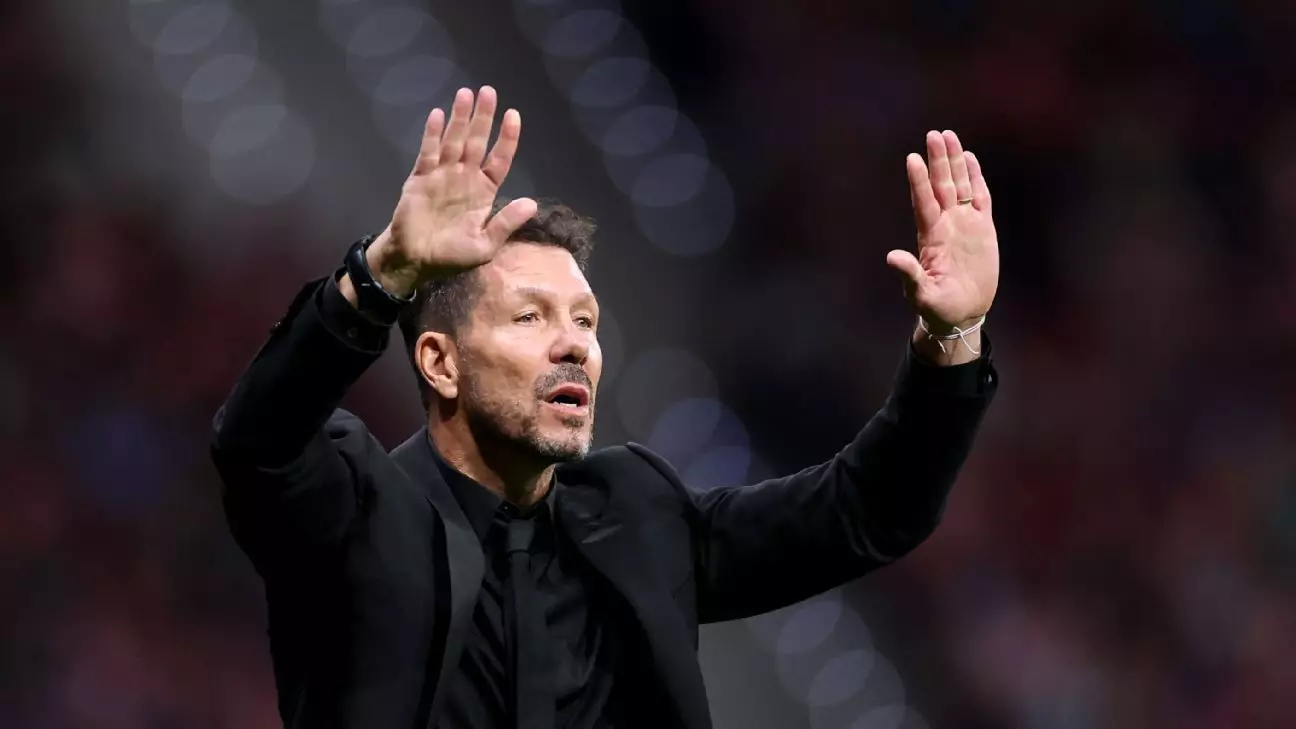The colorful yet tumultuous world of football is often marred by incidents that draw attention away from the game itself. This was glaringly evident during the recent Madrid derby, where Atlético Madrid coach Diego Simeone expressed grave concern over incidents of fan misconduct that led to the suspension of the match. The subsequent uproar highlights not only the complexities of sportsmanship but also the interplay between players, fans, and authority.
In the heat of competition, emotions can run high, but the Madrid derby—a matchup between fierce rivals Atlético Madrid and Real Madrid—reached an unsettling climax when fans began throwing objects onto the pitch. The match, overshadowed by a volley of agitation, experienced a suspension of about 20 minutes, resulting in a break that disrupted the game and reflected poorly on the club’s image. Objects such as lighters and plastic bottles were hurled in the direction of the players, initiating a dangerous atmosphere that compromised the safety of all involved.
Simeone’s critique of the fans was sharp; he demanded accountability not only from the spectators but also from the players who might incite such reactions. In his statements, he acknowledged that while the actions of fans were decidedly unacceptable, the on-field behavior—particularly post-goal celebrations—could exacerbate volatile situations. This sentiment struck at the very heart of how athletes interact with their supporters and the responsibilities they carry in maintaining a respectful relationship with them.
The chaotic scene drew immediate responses from those involved. As the referee first paused the game, a wave of communication aimed at calming the crowd followed. Coaches and team captains took it upon themselves to reach out to those in the stands, attempting to mitigate the emotional surge that had overtaken them. Simeone emphasized the importance of the club’s image, urging fans to reflect on their actions and consider what support truly meant.
“How could such actions help the team?” he asked, implicitly urging fans to channel their passion into encouraging rather than destructive behavior. Even more troubling was the justification offered by some attendees, who claimed they had been provoked by opposing players—in this case, Real Madrid’s Thibaut Courtois. This statement opens up deeper questions regarding accountability and the cyclical nature of provocation and reaction in high-stakes sporting environments.
The decision by referee Mateo Busquets Ferrer to halt the game was a pivotal moment. It signified a refusal to tolerate indiscretions that threaten the bedrock of sportsmanship. Real Madrid’s coach, Carlo Ancelotti, backed this judgment, appreciating the need for immediate action to maintain safety and decorum. The referee’s choice to call off the match, albeit momentarily, exposed the haunting truth of the conditions in which modern sports often unfold—conditions beset by potential violence, both internal and external.
In the aftermath, the Atlético Madrid club declared their commitment to addressing the situation. Their investigation, initiated in cooperation with law enforcement, sought to identify individuals responsible for the uproar. Such actions reflect a growing recognition of the need to foster a more secure environment in sports, far removed from the ethos of aggression that incidents like this invoke.
The implications of such disruptive behavior extend beyond immediate injury risk or match delays. As public sentiment increasingly leans towards accountability and sportsmanship, the actions of a few can darken the reputation of an entire team. In addition, a recent social media campaign encouraging fans to don face masks to evade detection while engaging in racist behavior exemplifies how harmful ideologies can infiltrate fan culture. Such trends pose significant risks to the sport, compelling governing bodies to intervene actively while striving for a culture that embraces inclusiveness rather than division.
As the dust settles on this alarming incident, the broader football community must confront the intertwined issues of fan behavior, player accountability, and the overarching responsibility clubs have towards fostering safe and supportive environments. The Madrid derby incident serves as a cautionary tale, reiterating the importance of reflection and prudence. Only by taking collective responsibility can the sport rise above such discord and cultivate a rich, vibrant atmosphere where respect prevails over turmoil. The onus lies on everyone—from the fields to the stands—to ensure that the love of football remains unmarred by the actions of the few.


Leave a Reply